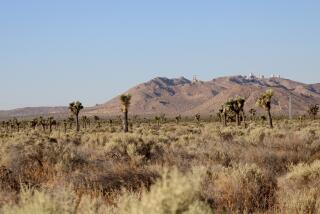Court rejects U.S. bid to establish corridors for new electric transmission lines
A federal court Tuesday rebuffed the U.S. Department of Energyâs attempt to establish national interest corridors for new high-voltage electric transmission lines that would cover 100 million acres in 10 states, including state and national parks in the Mojave Desert.
The three-judge panel from the U.S. 9th Circuit Court of Appeals ruled 2 to 1 that the energy agency failed to adequately consult affected states or conduct federally mandated environmental reviews in identifying vast swaths of land as suitable for fast-track treatment of applications to construct transmission facilities to supply areas of inadequate capacity. The agencyâs report focused on the Mid-Atlantic states and a chunk of the Southwest that includes parts of Arizona and much of Southern California.
Environmental groups hailed the decision as a victory for the effectiveness of national environmental laws and as a warning against pell-mell development of sensitive public lands, even in the guise of national interest.
âWe feel fantastic; itâs a huge victory,â said Anjali Jaiswal, an attorney with the Natural Resources Defense Council who argued the case before the 9th Circuit last summer. âThe court sent a signal to DOE to change their approach, to find an approach that balances our⦠energy needs, but in an environmentally safe way.â
The ruling could be a blow for area utilities such as the Los Angeles Department of Water and Power, Southern California Edison Co. and San Diego Gas & Electric Co., all of which have faced opposition to transmission lines that would extend hundreds of miles through numerous communities. The companies are under pressure to meet state guidelines to generate more of their electricity from renewable sources such as wind, solar and geothermal energy. The proposed transmission lines would handle the increased renewable power that is expected to come onto the grid.
The court directed the department to start its so-called congestion study again.
âThis is another setback, without question another blow, at a time when we still are trying to build much needed new transmission,â said Jim Owen, director of media relations at the Edison Electric Institute in Washington, a utility trade group.
âWe do know that utilities in California, along with more than 30 other states, are under mandates to provide a certain percentage of renewable energy to customers,â Owen said. âAdditional transmission capacity is going to be needed to make that happen.ââ
The court was unpersuaded by the Department of Energyâs argument that its action would not result in environmental impacts because it merely identified broad corridors and did not issue permits to license specific routes.
Judge Consuelo M. Callahan, writing for the majority, found ââ¦precedents hold that an agency cannot merely assert that its decision will have an insignificant effect on the environment, but must adequately explain its decision.â
âItâs absurd to conclude there is no harm when the federal government failed to conduct any studies to determine that,â said Stephan Volker, an Oakland-based attorney who represented citizens groups in the Mojave Desert that intervened in the case.
In her dissent, Judge Sandra S. Ikuta called the case âa tale of two errors.â Ikuta agreed that the Department of Energy didnât fully try to consult with the states, but argued that sending the entire study back to the agency for a top-to-bottom revision would only compound the error.
The proposed corridor would have included a wide swath across the California desert, through Death Valley and Joshua Tree national parks as well as the Mojave National Preserve, several military bases, Anza-Borrego Desert State Park and seven national forests.
Tuesdayâs ruling also chided the agency for failing to follow Congressâ direction to consult with states before preparing its analysis of areas with critical energy demands. The court found that the DOEâs power to identify utility corridors took power away from states and, among other things, would allow the federal government the right to condemn property through eminent domain.
Donna Charpeid, who lives near Joshua Tree and is a party to the lawsuit, said the ruling was a victory, in part because so few people seem to think the desert needs defending.
âI donât know why the masses in urban areas seem to think the desert is a wasteland and a sink,â she said. âI wish sometimes we could get a polar bear out here and get some attention to this place. How can people say thereâs nothing worth saving?â
More to Read
Sign up for Essential California
The most important California stories and recommendations in your inbox every morning.
You may occasionally receive promotional content from the Los Angeles Times.











